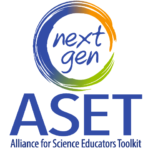
Conceptual Goals
Overview
A lesson or unit should build students’ understanding of scientific concepts as they relate to a larger natural phenomenon. The conceptual goals of a lesson or unit are these larger scientific concepts that students should understand by the end of instruction (Wiggins & McTighe, 2001). To fully explain complex scientific phenomena, an understanding of how several scientific concepts work together is needed. In this case, the educator must choose which of these concepts to focus on for the purposes of a lesson or unit, based on the learning needs of his or her students. Conceptual goals are related to the NGSS Disciplinary Core Ideas, which refer to more specific science ideas underlying scientific phenomena. However, conceptual goals refer to broader themes in science (Duschl, 2008), such as cellular division or properties of water.
Instructions for 3D Map
List and briefly describe the key scientific concepts that you want students to understand by the end of the lesson or unit. These concepts should underlie the phenomenon and connect to the performance expectations towards which the lesson or unit builds understanding.
Guiding Questions
In planning the conceptual goals for the lesson or unit, you should ask yourself:
- What are all of the scientific concepts that contribute to the understanding of the target phenomenon? Which of these (or parts of these) will you focus on as the major conceptual goals of the lesson or unit?
- What crosscutting concept(s) could students apply to explore these concepts?
- What science and engineering practices (SEPs) could students utilize to explore these concepts?
- How do the conceptual goals build students’ ability to successfully fulfill the identified performance expectation(s)?
- What related scientific concepts have you already covered with your students?
- How do the conceptual goals of this lesson or unit build on these prior concepts?
- How can you explicitly connect these prior concepts to the conceptual goals of this lesson or unit?
- How do the conceptual goals of this lesson or unit fit into the larger goals that you have for your students’ understanding of scientific concepts for the school year?
References
Duschl, R. (2008). Science education in three-part harmony: Balancing conceptual, epistemic, and social learning goals. Review of research in education, 32(1), 268- 291.
Wiggins, G., & McTighe, J. (2001). What is backward design? In: Understanding by Design. Upper Saddle River, NJ: Merrill Prentice Hall, pp. 7-19.
